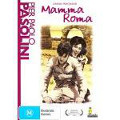
Directed by
Pier Paolo Pasolini
110 minutes
Rated M
Reviewed by
Bernard Hemingway


Mamma Roma
Pasolini's second feature stars Anna Magnani who had been so impressed by his first feature, Accatone (1961), as to ask him to cast her in his next film. The result, a story of a bawdy middle-age prostitute (Magnani), her feckless teenage son (Ettore Garofolo) and her nemesis of a pimp, Carmine (Franco Citti) is a film with a striking performance by an actress well-known for her lusty characterizations.
Shot largely on the dusty outskirts of Rome amongst cheaply-built high rise apartment buildings and vacant lots, it is a wonderfully vital, albeit somewhat uneven mix of social realism and oedipal melodrama that was denounced as obscene when it premiered at the Venice Film Festival in 1962. That alleged obscenity is actually a virtue for there is none of the programmatic sentimentality that characterises much of the neo-realist output but instead a frank confrontation of the crushing effects of poverty on the lower orders of society.
Those who appreciate Pasolini's rather raw approach to film-making will on the one hand accommodate the irregular narrative and on the other appreciate the director's heightening of the tragedy, best encapsulated in the film's latter stages with the striking, Masaccio-recalling shot of Ettore lying bound on a prison hospital bench as his mother grows more and more frantic. The director's sympathy for his subject, his directness and Magnani's performance make this a fine addition to the Italian neo-realist tradition.
DVD Extras: Restored to its 110-minute length from the originally released 105-minute version this Umbrella release also features Via Pasolini, a compile of Pasolini interviews in which the director reflects on aesthetic and socio-political matters; and a somewhat halting commentary by Andrea Rizzi, a University of Melbourne lecturer in Italian.
Available from: Umbrella Entertainment
Want something different?





